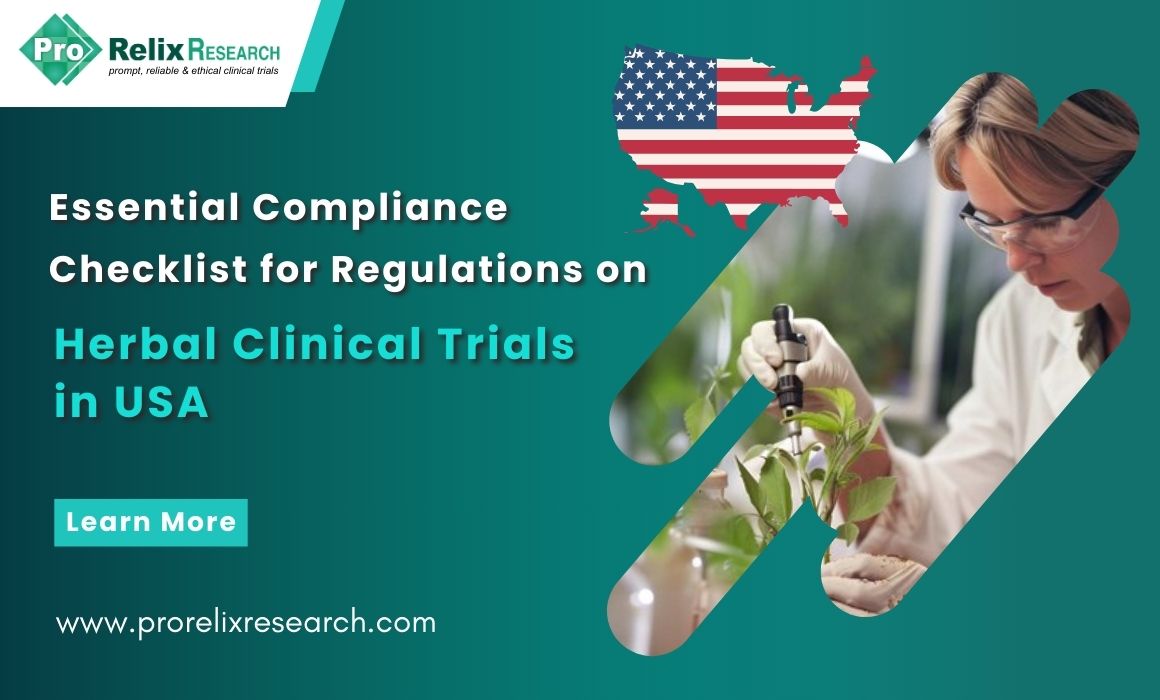Master key regulations and compliance for Nutraceutical Clinical Trials in the USA to ensure trial success and legal safety
The nutraceutical industry has witnessed an impressive surge in recent years, driven by increasing consumer demand for preventive and therapeutic health solutions. Nutraceuticals—bioactive compounds derived from food sources—promise numerous health benefits, ranging from enhancing immunity to supporting cardiovascular health. As more consumers seek scientifically-backed products, the necessity for clinical validation of these health claims has never been greater. However, conducting Nutraceutical Clinical Trials in the USA comes with a strict regulatory framework that sponsors must navigate to ensure safety, efficacy, and ultimately, market success. Adherence to these regulations not only ensures credibility but also plays a pivotal role in consumer trust and brand reputation.
Understanding the Regulatory Landscape
In the United States, the regulatory oversight of nutraceuticals falls under the jurisdiction of the U.S. Food and Drug Administration (FDA). However, unlike pharmaceuticals, nutraceuticals are categorized as dietary supplements under the Dietary Supplement Health and Education Act (DSHEA) of 1994. This classification allows nutraceuticals to bypass the premarket approval process mandated for drugs. Despite this, these products remain subject to stringent safety, labeling, and manufacturing standards.
For companies seeking to conduct nutraceutical clinical trials, understanding the regulatory landscape is crucial. By adhering to FDA regulations for nutraceutical trials, sponsors can ensure that their products meet the necessary standards for consumer safety and scientific validation.
Key Compliance Requirements for Nutraceutical Clinical Trials
The regulatory compliance required for Nutraceutical Clinical Trials in the USA is designed to ensure the safety of participants, the scientific integrity of the trials, and the credibility of the results. These requirements are non-negotiable and provide a clear pathway for bringing nutraceuticals to market in a responsible manner.
1.Good Clinical Practice (GCP) Compliance
Adherence to Good Clinical Practice (GCP) is vital in conducting nutraceutical clinical trials. GCP ensures that trials are ethically sound, scientifically rigorous, and regulatory-compliant. This framework emphasizes the rights and welfare of participants, data integrity, and proper documentation. GCP compliance serves as the bedrock of a trial’s credibility, ensuring that it meets the highest ethical and scientific standards.
2.Institutional Review Board (IRB) Approval
An essential component of ensuring the ethical conduct of clinical trials is obtaining approval from an Institutional Review Board (IRB). The IRB evaluates the study’s ethical considerations, weighing the potential risks against the anticipated benefits for participants. Without IRB approval, a clinical trial cannot proceed, as the safety and rights of participants must be safeguarded at every stage of the research process.
3.Informed Consent Process
Informed consent is a cornerstone of ethical research practice. Prior to enrolling in a clinical trial, all participants must be fully informed about the trial’s purpose, potential risks, benefits, and their rights as participants. This process ensures transparency and upholds participant autonomy, fostering trust and ethical responsibility throughout the duration of the trial.
4.Product Quality and Standardization
For nutraceutical trials to generate reliable data, product consistency is paramount. Nutraceuticals must be rigorously tested to verify that each batch contains consistent levels of active ingredients. Inconsistent formulations can undermine the validity of clinical trial outcomes and lead to regulatory scrutiny. This is particularly important in the context of the FDA regulations for nutraceutical trials, which demand a high degree of product standardization to guarantee both safety and efficacy.
5.Adverse Event Reporting
Even though nutraceuticals are classified as dietary supplements, sponsors are still required to document and report any serious adverse events (SAEs) that occur during clinical trials. These reports must be submitted to the FDA in accordance with established protocols, ensuring that participant safety is continuously monitored and that any potential risks are promptly addressed.
Challenges in Conducting Nutraceutical Clinical Trials
While the regulatory framework for Nutraceutical Clinical Trials in the USA is well-defined, sponsors often face significant challenges during the trial process.
1.Natural Ingredient Variability
Unlike pharmaceuticals, which typically rely on synthetic compounds with stable properties, nutraceuticals are derived from natural ingredients. These ingredients can vary significantly due to factors such as seasonal changes, geographical location, and processing methods. This variability can introduce inconsistencies in trial results, making it more difficult to draw definitive conclusions about the efficacy of the product.
2.The Placebo Challenge
One of the unique challenges in nutraceutical clinical trials is the strong placebo effect often observed in wellness-oriented products. Participants in nutraceutical trials may report feeling better due to psychological factors, even if the product being tested has no physiological effect. This can complicate the process of accurately assessing the product’s efficacy and further complicates the regulatory approval process.
3.Blurred Regulatory Lines
Because nutraceuticals exist at the intersection of food and pharmaceuticals, defining the correct regulatory pathway for each product can be complex. Sponsors must carefully navigate the Investigational New Drug (IND) application process when necessary, or else their product may fall under a different regulatory category. This ambiguity can lead to confusion and delays in the clinical trial process.
Best Practices to Ensure Regulatory Compliance
Ensuring compliance with FDA regulations for nutraceutical trials is not just about adhering to the minimum legal requirements—it’s about building a reputation for scientific rigor and ethical responsibility. Here are some best practices that can help sponsors successfully navigate the complexities of nutraceutical clinical trials.
Engage Early with the FDA
One of the most proactive steps a sponsor can take is to engage with the FDA early in the clinical trial process. By consulting with the FDA, sponsors can clarify whether their product requires an IND application and ensure they fully understand the regulatory expectations. This can help prevent misunderstandings and reduce the risk of delays during the trial. Early engagement can also allow sponsors to receive valuable feedback on study design, which may optimize the chances for approval and mitigate potential setbacks.
Adopt a Strong Study Design
A well-designed study is crucial for generating scientifically credible results. Double-blind, randomized, placebo-controlled trials are widely regarded as the gold standard in clinical research. These types of trials reduce bias, control for placebo effects, and provide the most robust evidence regarding a product’s efficacy. Additionally, careful consideration should be given to sample size calculations and statistical methodologies to ensure the study’s power to detect meaningful differences and support regulatory claims.
Maintain Accurate Documentation
Detailed, accurate records are vital in ensuring compliance. From participant recruitment logs to informed consent forms, all documentation must be meticulously maintained to demonstrate adherence to regulatory standards. This is particularly important in case of an audit or FDA inspection. Proper documentation serves as a comprehensive trail of evidence for compliance and can support the validity of trial outcomes if challenged during future assessments or reviews.
Implement Real-Time Monitoring
By utilizing advanced clinical trial management systems, sponsors can monitor compliance metrics and participant safety in real time. These platforms enable quick adjustments and allow for proactive interventions, reducing the likelihood of non-compliance or adverse events. Real-time data also facilitates better communication with regulatory bodies and stakeholders, ensuring any issues are addressed promptly and ensuring transparency throughout the trial process.
Why Compliance Matters in Nutraceutical Research
As the nutraceutical industry continues its remarkable expansion, the imperative of compliance with regulatory standards becomes more critical than ever. The market, poised to exceed $400 billion globally, is attracting increasing scrutiny from regulatory bodies, particularly the FDA. In this dynamic environment, maintaining rigorous adherence to FDA regulations for nutraceutical trials is not just a requirement, but a strategic necessity for long-term success. Failure to do so can result in significant setbacks, including:
- Delayed product launches
- FDA warning letters and sanctions
- Loss of consumer trust and brand reputation
- Legal and financial ramifications
On the other hand, conducting well-compliant trials enables sponsors to secure FDA approval, establish scientific credibility, and effectively market their products. Moreover, compliance serves as a cornerstone for global expansion, as many international markets require conformity to similar regulatory standards, further enhancing a brand’s international footprint.






